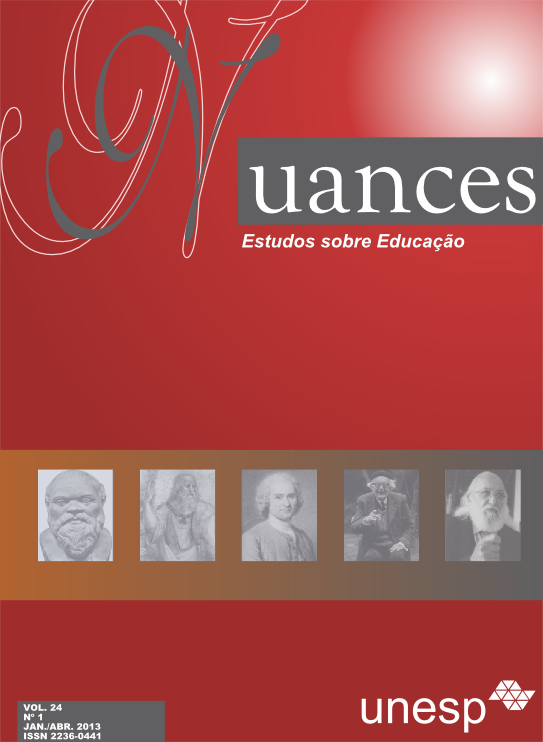CULTURAL-HISTORICAL THEORY AND EDUCATIONAL PRACTICE: SOME RADICAL-LOCAL CONSIDERATIONS
DOI:
https://doi.org/10.14572/nuances.v24i1.2151Palabras clave:
Dialectical tradition, Radical-local teaching and learning, Historical-cultural approachResumen
ABSTRACT: We emphasize that pedagogical practice was not just a way of validating and testing scientific findings but it has also, to generate new hypotheses and new challenges and research directions. This relationship between research, knowledge, and practice was recognised from the beginning days of the cultural-historical tradition, such as Vygotsky’s focus on practice for resolving the crisis in psychology. In a dialectical conception, pedagogical research should be developed as an interaction between theoretical conceptions in the cultural-historical tradition and the demands and needs of the societal practices. This article illustrates this idea concretely, using the idea of radical-local teaching and learning (HEDEGAARD; CHAIKLIN, 2005). The discussion starts with a brief comment about the dialectical tradition; than we illustrate one way to engage with the idea of full human development, viewing this in terms of personality development. We first explain the general idea of radical-local teaching and learning as a way to address the practical problem, and then show how it embodies the philosophical concerns of the dialectical tradition. The main idea is that core conceptual relations within subject-matter areas have to be related specifically to children’s life situation so that this academic knowledge can become integrated with local knowledge, thereby qualitatively transforming children’s everyday concepts and their possibility to use this knowledge in their local practice. We want to highlight the idea of how working with subject-matter content in a radical-local perspective can provide conditions for children to develop theoretical thinking and motive orientation, which is relevant to personality development, and which can be oriented to their full human development.
RESUMO: Enfatizamos que práticas pedagógicas não são somente formas de validação de investigações científicas, mas são também formas de se gerar novas hipóteses e novos desafios para a pesquisa. Essa relação entre investigação, conhecimento e prática foi reconhecida nos primórdios da teoria histórico-cultural quando Vygotsky discutiu a prática como forma de resolução da crise da psicologia. Na concepção dialética, a pesquisa pedagógica deve se desenvolver em interação com as concepções teóricas presentes na tradição histórico-cultural e as demandas e necessidades da prática social. Este artigo ilustra essa ideia concretamente, utilizando a ideia de radical-local ensino e aprendizagem (HEDEGAARD; CHAIKLIN, 2005). A discussão começa com um breve comentário sobre a tradição dialética, então, ilustramos um caminho para relacionar com a ideia de totalidade do desenvolvimento humano, considerando-o em termos do desenvolvimento da personalidade humana. Nós primeiramente explicamos a ideia geral sobre o modelo radical-local de ensino e aprendizagem como uma forma de chegar ao problema prático e então mostrarmos como esse processo de insere numa tradição dialética. A ideia principal é que concepções teóricas relacionadas como assuntos/temas-problemas precisam ser relacionados com as situações de vida das crianças de forma que os conhecimentos acadêmicos integrem-se aos conhecimentos locais/do contexto social dos sujeitos, com a finalidade de transformar a qualitativamente os conhecimentos cotidianos das crianças para que possam utilizá-los nas suas práticas sociais. Queremos enfatizar o quanto a proposta de trabalhar com assuntos/temas-problemas numa perspectiva radical-local possibilita condições para o uso desses conhecimentos na prática social local dos sujeitos para que eles possam desenvolver pensamentos teóricos diferenciados e orientar o desenvolvimento de sua personalidade na sua totalidade histórica e social.
Descargas
Descargas
Cómo citar
Número
Sección
Licencia
Atribuição-NãoComercial
CC BY-NC
Esta licença permite que outros remixem, adaptem e criem a partir do seu trabalho para fins não comerciais, e embora os novos trabalhos tenham de lhe atribuir o devido crédito e não possam ser usados para fins comerciais, os usuários não têm de licenciar esses trabalhos derivados sob os mesmos termos.





